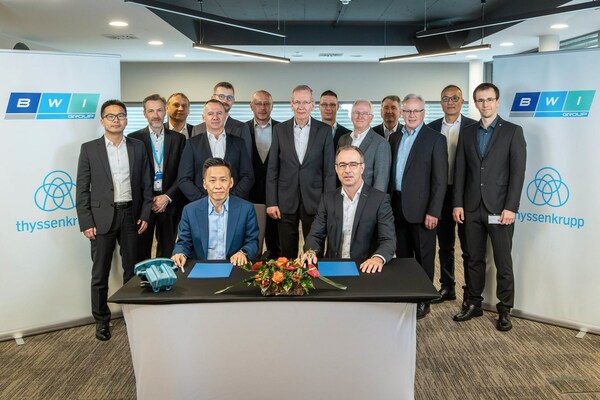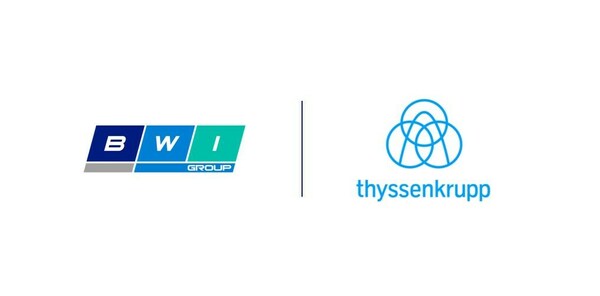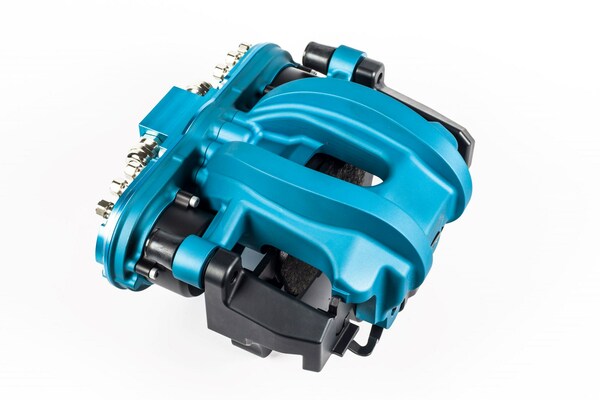BUDAPEST, Hungary, April 9, 2024 /PRNewswire/ -- BWI Group, a world-leading tier-1 intelligent automotive chassis supplier, and thyssenkrupp Steering, a global tier-1 automotive partner for steering solutions signed a contract for the development and manufacture of a pioneering Electro-Mechanical Brake (EMB) technology. This collaboration aims to further advance Level 3 and above autonomous driving brake capabilities.
The long-term cooperation will pave the way for further chassis-by-wire collaboration. The technical synergies will drive the future of X-by-wire chassis systems and enable the transformation from assisted to autonomous driving by enhancing safety, comfort and efficiency.
George Chang, CEO of BWI Group, and Patrick Vith, CEO of thyssenkrupp Steering, formalized the agreement in Budapest, Hungary, on April 9. Executives from both companies were present at the signing ceremony.

April 9, 2024, George Chang (Front Left), CEO of BWI Group, and Patrick Vith (Front Right), CEO of thyssenkrupp Steering, formalize the agreement in Budapest, Hungary. Executives from both companies present at the signing ceremony.
"We at BWI are excited about the future of chassis-by-wire," said George Chang, CEO of BWI Group. "We are pleased to be collaborating with thyssenkrupp Steering on this truly innovative technology, leveraging our expertise in braking systems since 1934 and our century-long heritage of chassis technology innovation to drive progress within the industry."
"Together, we want to contribute to the next generation of chassis systems and set standards for safety, performance, and sustainability" said Patrick Vith, CEO of thyssenkrupp Steering. "Our many years of experience as a major supplier in the steering sector will stand us in good stead."
Under the agreement, BWI Group and thyssenkrupp Steering will leverage their strengths and expertise in safety-critical systems and software to bolster their collaboration. Both companies will accelerate the joint development of EMB systems as one important element of future vehicle motion control (VMC) solutions.
BWI Group brings more than a century of history and real-world R&D and production experience to the development of the new EMB product, including expertise in brakes and suspension systems. It serves more than 50 customers worldwide. The company also leverages its prior experience with EMB systems as Delphi in the 2000s.
thyssenkrupp Steering has been developing steer-by-wire technology for many years. The company contributes deep knowledge of new electrical/electronic (E/E) architectures and software, as well as its competence in electro-mechanical braking systems derived from steering technology.

BWI and thyssenkrupp forge a long-term partnership to accelerate the joint development of EMB systems.
Dr. Karsten Kroos, CEO of thyssenkrupp Automotive Technology said "Through partnerships like this one, we aim to develop competitive components for modern chassis systems serving the global automotive industry in an agile, innovative, and capital-efficient manner. Our focus is on synergies in technology and costs."
Doug Carson, CTO of BWI Group said: "We have strong expectations in forging this strategic partnership with thyssenkrupp. Together, our brake-by-wire expertise will drive chassis technology breakthroughs that meet global standards and promote EMB adoption in Europe, North America, and Asia."
EMB R&D will occur at BWI Group's global R&D Centers located in Italy, Poland, U.S. and China, along with its Shanghai Software Center; thyssenkrupp's technical centers in Hungary and Liechtenstein will also perform significant roles.
Pioneering full-dry EMB technology
The jointly developed EMB system is a premier offering that complements both companies' controlled chassis portfolios. The two companies are now developing the third generation of EMB, a revolutionary technology that fulfills the need for simplified vehicle assembly while providing braking redundancy for Level 3 and above autonomous driving technologies.
Featuring a dual-motor design, efficient packaging, and novel redundancy, the newly developed EMB caliper ensures safety and reliability. Its reaction speed for time to wheel lock (TTL) is nearly twice as fast than modern one box wet brake systems. Additionally, it enables complete braking energy recovery and fully meets the electric and intelligent needs of braking systems for smart vehicles.
EMB is a visionary brake technology that eliminates the need for brake fluid while offering precise control with zero drag. It will become the definitive solution for future brake-by-wire technology, replacing current hydraulic calipers, and the accompanying One-Box and Two-Box brake actuation/modulation systems.
Globalized production anticipated in 2026
Looking ahead, the project plans to establish state-of-the-art automated production lines by 2025. Production and product delivery are expected to begin in 2026. BWI Group's advanced automated production facilities worldwide will coordinate and expedite the mass production of EMB systems, ensuring this groundbreaking technology is available to a wide array of automakers worldwide.
Leveraging BWI Group's nine manufacturing facilities and multiple proving grounds spread across key automotive centers in Asia, Europe, and North America, this cooperation regarding EMB systems, ensures efficient production and widespread distribution. Because the products are designed for worldwide markets, they will be manufactured to high standards to fulfill the variety of local demands and requirements.
Strong market growth ahead
EMB technology is becoming the focus of key automotive manufacturers, and it represents game-changing evolution for automotive chassis systems and the future demands of propulsion drive systems, electrification, performance, and sustainability.
The jointly developed EMB caliper system underwent dynamic tests in Sweden, U.S. and China. Enthusiastic feedback and interests well as cooperation intentions were secured with major automakers in the three continents.
An industrial forecast projects that EMB calipers will contribute 13% of the total global braking market by 2035.
 1 year ago
322
1 year ago
322 






 English (United States)
English (United States)